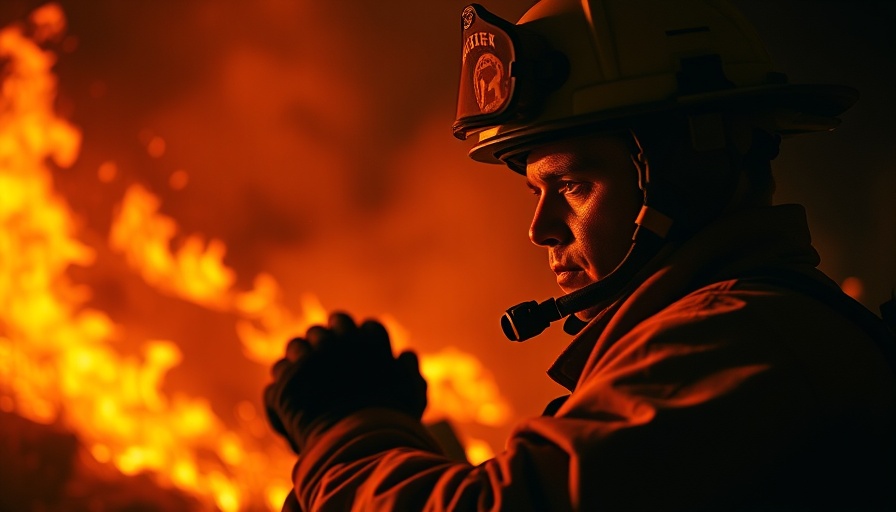
Understanding Arizona's Proposed Bill Shifting Wildfire Liability: A Mixed Bag for Insurers and Homeowners
Arizona lawmakers are currently considering a significant bill poised to transform how wildfire liability is handled, potentially shaking the foundations of the insurance industry in the region. The proposed legislation aims to protect utility companies from lawsuits linked to wildfires caused by their equipment, a move that is raising eyebrows and concerns across Arizona.
What the Proposed Bill Entails
The bill would create a framework wherein utilities could limit their liability for wildfires, making it more challenging for plaintiffs to prove negligence due to faulty equipment. While utilities would need to devise and submit risk mitigation plans every two years, the effectiveness of these plans remains questionable as there are no stringent enforcement measures in place. Critics argue that this lack of accountability could lead to an increase in wildfire incidents exacerbated by climate change.
Economic Implications: The Ripple Effect on Insurance Premiums
One of the most immediate consequences of this new liability structure could be a shift in the economic burden from utilities to insurance companies and ultimately to homeowners. Insurer Marcus Osborn highlighted the dilemma that homeowners might face: “You’re either going to pay in higher insurance premiums or you’re going to pay in higher utility costs.” With some Arizonans already experiencing tripled insurance rates, the financial strain on residents could deepen if insurance companies raise rates to counterbalance their increased liability. The recent losses faced by insurtech startups due to wildfire-related claims serve as a stark warning of the rising costs associated with fire damages.
The Climate Change Factor: A Growing Concern
Wildfires in the Western U.S. are not a new phenomenon, but their frequency and intensity have drastically escalated due to climate change. Factors such as prolonged drought, warmer winters, and an increase in dry underbrush due to fire suppression practices over decades have compounded wildfire risks. Rising temperatures contribute to drier conditions, which in turn make wildfires more prevalent and devastating. This historical context emphasizes the need for effective wildfire management strategies rather than assigning liability without accountability.
Counterarguments: Balancing Utility Protection and Homeowner Interests
While the bill seeks to quantify and mitigate risks associated with wildfires for utility companies, it has also ignited fierce opposition from various stakeholders, including insurance companies and homeowner advocates. Many argue that this approach undermines the rights of individuals affected by such disasters, hindering their ability to seek reparations. Notably, the push for utility immunity could lead to a decrease in operational standards for infrastructure maintenance and risk management practices.
A Broader Perspective: State-Specific Initiatives
This bill is not isolated but mirrors a broader trend in Western states grappling with similar wildfire threats. California and Oregon have seen significant fallout from utility-caused fires, leading to intense scrutiny and legal challenges against power companies. Arizona's lawmakers, spurred by these developments, are attempting to navigate a balance between protecting utility companies and ensuring appropriate compensation for affected homeowners.
Future Predictions: What Lies Ahead for the Insurance and Utility Industries
The outcome of this proposed bill could potentially reshape the insurance landscape in Arizona and offer a glimpse into the strategies other states may implement. As climate change continues to influence wildfire patterns, both utility and insurance industries will have to adapt. It’s possible that if these legislation trends continue, we may see increased innovation in insurance products tailored to wildfire risks, including the rise of more robust risk assessment technologies and mitigation strategies.
In Conclusion: The Call for Vigilance Remains
The proposed wildfire liability shift represents a complex interaction between corporate interests, homeowner rights, and the impacts of climate change. As discussions unfold, it remains crucial for residents and lawmakers to carefully weigh the economic ramifications against the pressing need for sustainable wildfire management practices. With wildfires expected to be a looming threat in the years to come, accountability, transparency, and proactive measures will be key in forming policies that ultimately protect both the environment and the people it affects.
 Add Row
Add Row  Add
Add 



Write A Comment